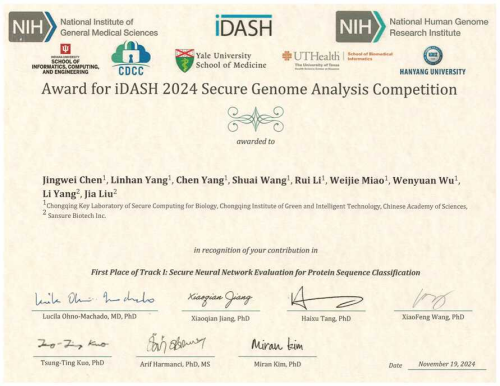

November 9th 2024 — The 11th iDASH Privacy & Security Workshop was held at the UCSD Millberry Union Conference Center in the United States, where the winners of the 2024 iDASH Competition were announced. The team SCB@Chongqing, led by professor Wenyuan Wu and Associate professor Jingwei Chen from Chongqing Key Laboratory of Secure Computing for Biology (scb.cqucas.ac.cn) at the Chongqing Institute of Green and Intelligent Technology, Chinese Academy of Sciences, triumphed over the rivals in the Homomorphic Encryption track.
Jointly organized by Yale University, UCSD, University of Texas, and Indiana University, the 2024 iDASH competition featured two tracks this year: Homomorphic Encryption and Federated Learning. The competition attracted over 50 teams from around the world, including industry giants like Intel, Tencent, and Ant Group.
In the Homomorphic Encryption track, participants were tasked with developing secure solutions using homomorphic encryption to enable non-interactive encrypted inference with a transformer-based neural network model named DASHformer for protein sequence classification. The organizers provided 100 unreleased protein sequences to evaluate each team's solution based on classification prediction accuracy (MicroAUC) and total execution time, calculating final scores according to the track's criteria.
SCB@Chongqing's solution stood out, outperforming strong contenders including previous champions like the Tencent-HUST joint team and Intel. This is the first time a team primarily from a research institution from China has won the championship in this prestigious competition.
The winning solution leveraged techniques developed under the support from National Key Research and Development Program (2020YFA0712300), including tensor encoding, improved encrypted matrix multiplication, and data-driven quadratic activation function substitutions. These innovations enabled the encrypted protein classification MicroAUC of DASHformer to an impressive 0.941. Remarkably, in terms of efficiency, their solution achieved an amortized time of just about one second per sequence on a standard desktop computer—only one-third of the time taken by the runner-up—laying a solid foundation for future industrial applications.
iDASH (Integrating Data for Analysis, 'anonymization,' and Sharing) is one of the National Centers for Biomedical Computing under the NIH Roadmap for Bioinformatics and Computational Biology. Since launching the iDASH Privacy Computing Competition in 2014, it has become the world's premier competition in the fields of privacy computing and data privacy protection. Held annually, the competition sets 2 to 4 tracks each year, each focusing on different privacy computing technologies—such as differential privacy, homomorphic encryption, blockchain, and trusted execution environments—to tackle privacy protection challenges in genomic data applications. It has become a main arena for global tech companies and research institutions to showcase their capabilities in Privacy Computing.
The Homomorphic Encryption track has been a fixture since 2015, marking its tenth year in this edition. Previous champions include renowned research institutions and high-tech enterprises worldwide, such as Stanford University (USA), MIT (USA), UCSD (USA), Microsoft (USA), CEA (France), Inpher (Switzerland), Samsung SDS (South Korea), Seoul National University (South Korea), A*STAR (Singapore), Ant Group (China), Tencent (China), and others.
